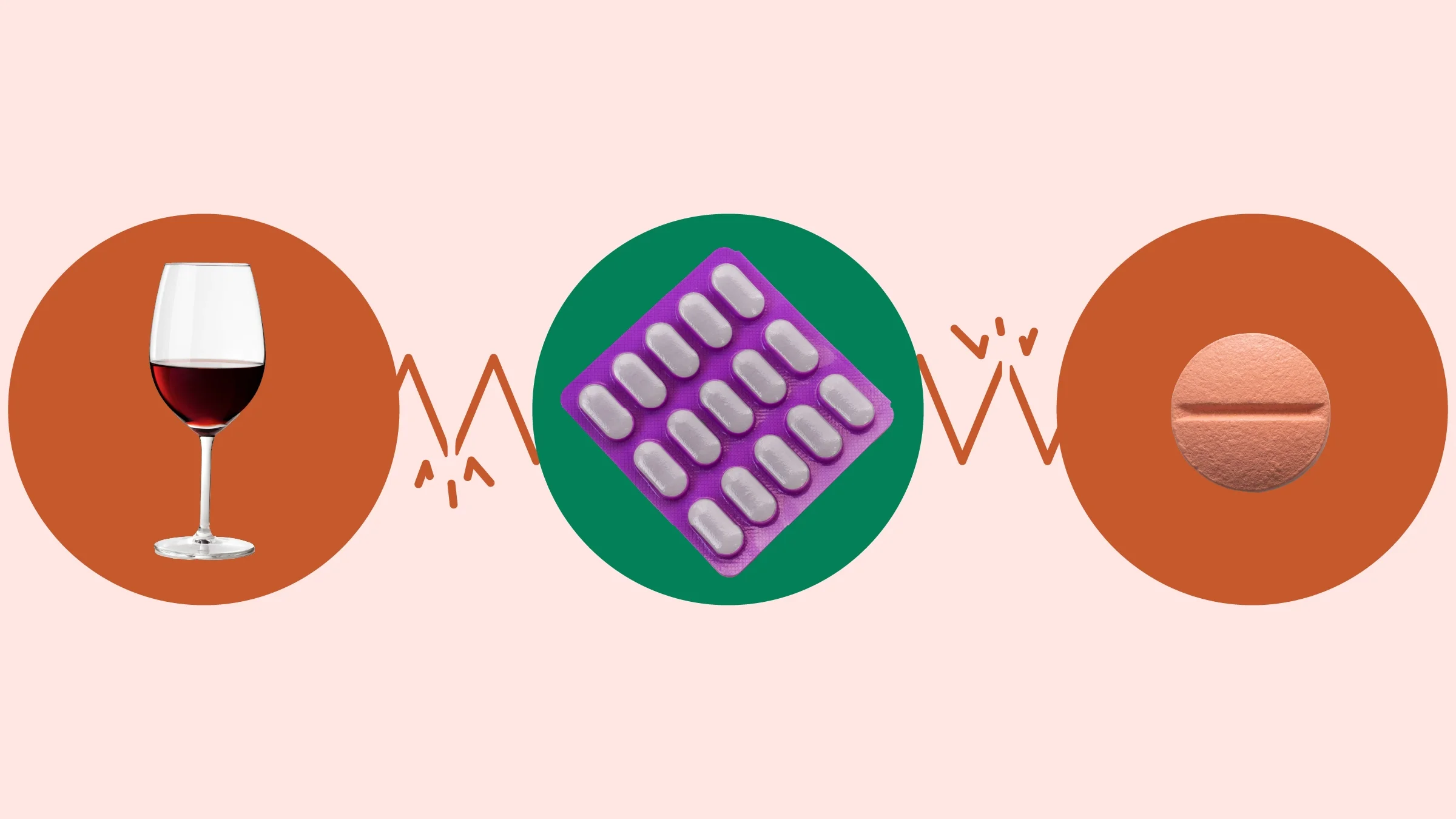Key takeaways:
Augmentin (amoxicillin / clavulanate) is an antibiotic that treats bacterial infections. It’s best to avoid combining Augmentin and alcohol or other medications that can upset your stomach.
Augmentin can increase the risk of bleeding if you take it with warfarin (Coumadin, Jantoven). And it can increase the risk of skin rashes if you take it with allopurinol (Zyloprim). It’s best to avoid taking Augmentin with probenecid, too, as it can raise Augmentin levels in your body.
Make sure your prescriber and pharmacist have your full medication list before starting Augmentin. They can review it for any potential Augmentin interactions and resolve any issues before they occur.
Save on related medications
Augmentin (amoxicillin / clavulanate) is a common antibiotic that’s prescribed to treat bacterial infections. It contains two ingredients that work together to fight bacteria. Augmentin is effective and relatively well tolerated. But like any medication, it has some interactions that are helpful to know about.
Here, we’ll review five Augmentin interactions and how to manage them, including why you shouldn't mix Augmentin and alcohol. Keep in mind this isn’t a full list of all possible interactions. Your prescriber and pharmacist can review your medication list to help keep an eye out for any issues before you start taking Augmentin.
1. Alcohol
When it comes to Augmentin and alcohol, it’s best to avoid this combination.
Alcohol interacts with Augmentin and other antibiotics in a couple of ways. First of all, alcohol can worsen some Augmentin side effects, such as nausea and diarrhea. Secondly, alcohol can weaken your immune system. This can make it harder for Augmentin to fight off your infection.
In short, it’s best to avoid mixing Augmentin and alcohol so you can get better faster with fewer side effects.
2. Warfarin
Warfarin (Coumadin, Jantoven) is a blood thinner that helps prevent unwanted blood clots. Warfarin can interact with many foods and medications, including Augmentin.
Augmentin can raise the risk of bleeding if you take it with warfarin. The risk is even higher if you take warfarin and Augmentin along with other medications that make bleeding more likely. This includes nonsteroidal anti-inflammatory drugs (NSAIDs), such as ibuprofen (Advil, Motrin) and naproxen (Aleve).
If you take warfarin, let your prescriber know before you start taking Augmentin. They may want to switch you to a different antibiotic. Or they may have you come in for more frequent blood tests to make sure your warfarin dosage is appropriate.
If you’re taking Augmentin and warfarin together, keep an eye out for signs of bleeding. This includes bruises with no known cause, frequent nose bleeds, or any bleeding that lasts longer than 10 minutes. Let your prescriber know if any unusual bleeding happens so they can take steps to address it.
3. Probenecid
Probenecid is a medication that treats gout. Probenecid makes it harder for your body to get rid of amoxicillin (one of the ingredients in Augmentin) through your kidneys. This could raise your risk of side effects from the antibiotic.
Let your prescriber know you take probenecid before starting Augmentin. This combination isn’t recommended. So they’ll likely prescribe a different antibiotic for you.
4. Allopurinol
Allopurinol (Zyloprim) is another medication that treats gout. Augmentin and allopurinol can both cause skin rashes as a side effect. And you’re more likely to develop a rash if you take them together.
Curious about Augmentin side effects? Common Augmentin side effects include diarrhea, nausea, and vomiting.
Augmentin dosages: Here are common Augmentin dosages for adults and children along with tips on how to take it correctly.
How much does Augmentin cost? Learn more about the cost of Augmentin without insurance and how to save.
In most cases, skin rashes from these medications are mild. But in rare cases, a skin rash can be a sign of:
Stevens-Johnson syndrome (SJS)
Rash may appear flat, with dark red, purple, or brown patches that are painful
Skin may peel
Sores may present in the mouth, eyes, and genitals
May also have a fever and body aches
Drug reaction with eosinophilia and systemic symptoms (DRESS)
Rash may appear as red, brown, or purple patches or bumps
May feel itchy
May also have swelling, fever, and enlarged lymph nodes
Rash may appear as raised, itchy bumps that are red, violet, or brown
Trouble breathing or swelling of the mouth and throat are possible
If you develop a skin rash while taking allopurinol and Augmentin, it’s best to contact your prescriber right away. Call 911 or go to the nearest ER if you’re having trouble breathing or symptoms seem severe or life-threatening.
5. Medications that upset your stomach
Stomach-related side effects, such as diarrhea, nausea, and vomiting, are common with Augmentin. If you combine it with other medications that upset your stomach, the chance of these side effects goes up. This includes:
Some antidepressants
NSAIDs
Metformin
Opioids
GLP-1 medications, such as semaglutide (Ozempic, Wegovy) and tirzepatide (Mounjaro, Zepbound)
In most cases, you can still take Augmentin with these medications. But you may want to take extra steps to help avoid or manage nausea. This includes:
Avoiding fried, fatty, or spicy foods
Eating several small meals throughout the day
Staying hydrated
If you vomit within 15 to 30 minutes after taking Augmentin, you may need to retake your dose. Let your prescriber know if this happens, as you may need more Augmentin to complete the full course of your treatment.
Frequently asked questions
Despite popular belief, Augmentin and other penicillin antibiotics don’t make hormonal birth control less effective. According to recommendations from leading organizations such as the CDC, most common antibiotics don’t impact the efficacy of birth control. However, there are some antibiotics that can affect how well hormonal birth control works. This includes rifampin (Rifadin) and rifabutin (Mycobutin).
Liver problems aren’t common with Augmentin, but they can happen even after you’ve finished taking it. In most cases, liver problems from Augmentin are temporary and go away on their own. But the risk for liver problems is higher with frequent or long-term Augmentin treatment. It’s also higher for older adults as well as those with a history of liver problems.
Reach out to your prescriber if you experience fatigue, stomach pain, and/or yellowing of your skin or eyes during or after Augmentin treatment.
There isn’t a direct interaction between Augmentin and coffee. But caffeinated drinks, including coffee and soda, can irritate your stomach. This may increase the risk of stomach-related side effects while taking Augmentin. So it’s a good idea to separate Augmentin from your morning coffee by an hour or two if possible. Or be sure to eat something before you combine the two.
Despite popular belief, Augmentin and other penicillin antibiotics don’t make hormonal birth control less effective. According to recommendations from leading organizations such as the CDC, most common antibiotics don’t impact the efficacy of birth control. However, there are some antibiotics that can affect how well hormonal birth control works. This includes rifampin (Rifadin) and rifabutin (Mycobutin).
Liver problems aren’t common with Augmentin, but they can happen even after you’ve finished taking it. In most cases, liver problems from Augmentin are temporary and go away on their own. But the risk for liver problems is higher with frequent or long-term Augmentin treatment. It’s also higher for older adults as well as those with a history of liver problems.
Reach out to your prescriber if you experience fatigue, stomach pain, and/or yellowing of your skin or eyes during or after Augmentin treatment.
There isn’t a direct interaction between Augmentin and coffee. But caffeinated drinks, including coffee and soda, can irritate your stomach. This may increase the risk of stomach-related side effects while taking Augmentin. So it’s a good idea to separate Augmentin from your morning coffee by an hour or two if possible. Or be sure to eat something before you combine the two.
The bottom line
Augmentin (amoxicillin / clavulanate) is an antibiotic that treats bacterial infections. It’s best to avoid combining Augmentin and alcohol or other medications that can upset your stomach. Augmentin can increase the risk of bleeding if you take it with warfarin (Coumadin, Jantoven). And it can increase the risk of skin rashes if you take it with allopurinol (Zyloprim). It’s best to avoid taking Augmentin with probenecid, too, as it can raise Augmentin levels in your body.
To help prevent Augmentin interactions, make sure your prescriber and pharmacist have your full medication list. They can review it for any potential Augmentin interactions, and resolve any issues before they occur.

Why trust our experts?



References
LiverTox: Clinical and Research Information on Drug-Induced Liver Injury. (2020). Amoxicillin-clavulanate. National Institute of Diabetes and Digestive and Kidney Diseases.
Morbidity and Mortality Weekly Report (MMWR). (2010). Appendix B. Centers for Disease Control and Prevention.
Nehlig, A. (2022). Effects of coffee on the gastro-intestinal tract: A narrative review and literature update. Nutrients.
RemedyRepack. (2025). Amoxicillin and clavulanate potassium tablet, film coated [package insert].
Sugiyama, K., et al. (2024). Impact of antibacterials on the quality of anticoagulation control in patients initiating warfarin therapy. American Journal of Cardiovascular Drugs.

















